MBA Research: Analyzing Advertising's Impact on Amazon Customers
VerifiedAdded on 2023/01/05
|13
|3316
|37
Report
AI Summary
This research report, submitted as part of an MBA program, investigates the influence of online advertising on customer purchasing decisions, with a specific focus on Amazon. The study utilizes a secondary research methodology, analyzing existing market reports, academic literature, and online data to understand consumer behavior and the effectiveness of online advertising strategies. The research addresses key questions, including how online advertising shapes customer perspectives, the various methods of online advertising, the challenges associated with it, and potential solutions. The report aims to provide valuable insights for businesses, particularly Amazon, by identifying opportunities to enhance their online advertising practices and improve customer engagement. The project's educational value lies in its contribution to the student's understanding of business principles and its potential to inform strategic decision-making within the industry, offering practical applications for both the academic and professional realms. The research also explores the potential societal and economic benefits of effective advertising strategies.
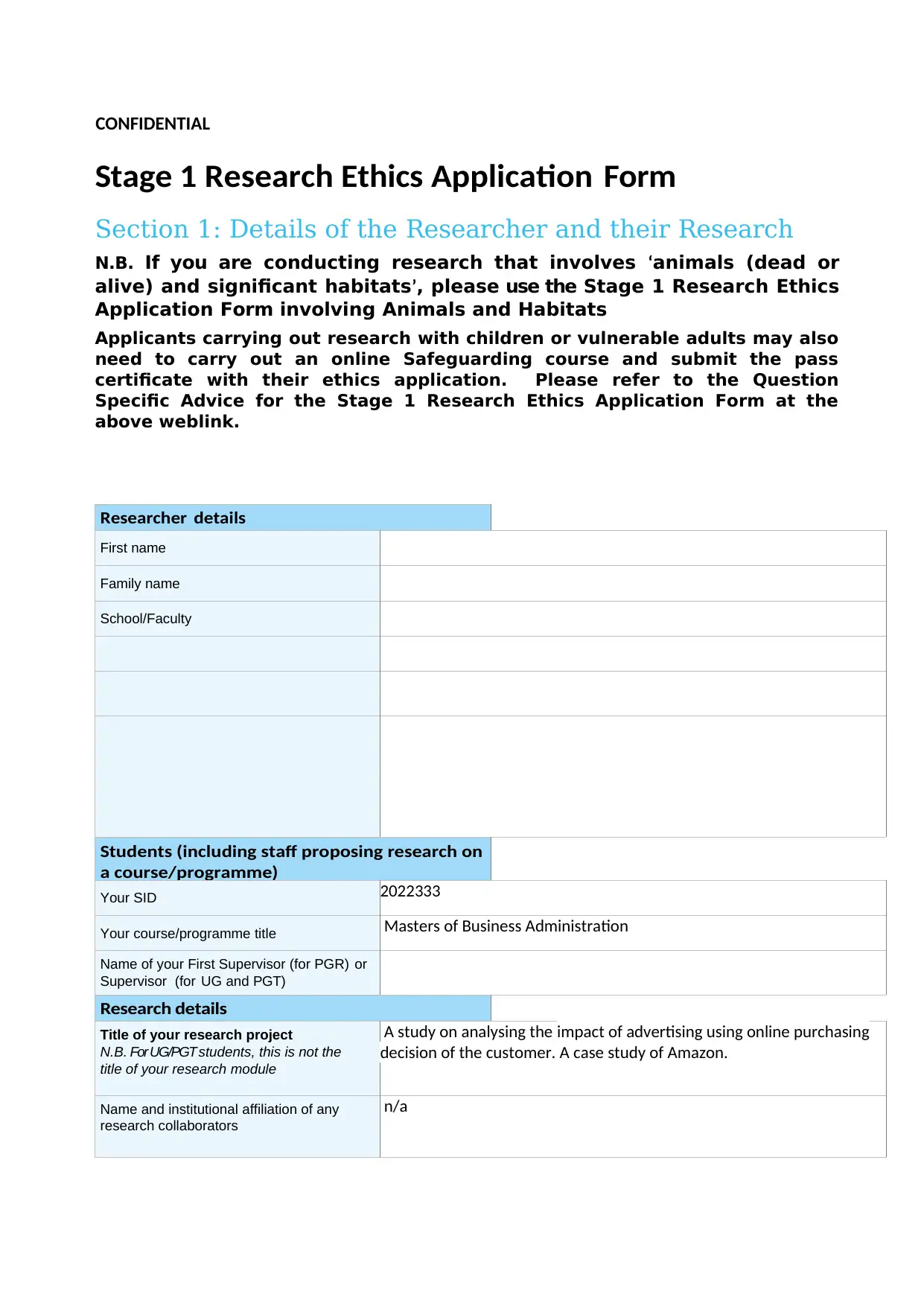
CONFIDENTIAL
Stage 1 Research Ethics Application Form
Section 1: Details of the Researcher and their Research
N.B. If you are conducting research that involves ‘animals (dead or
alive) and significant habitats’, please use the Stage 1 Research Ethics
Application Form involving Animals and Habitats
Applicants carrying out research with children or vulnerable adults may also
need to carry out an online Safeguarding course and submit the pass
certificate with their ethics application. Please refer to the Question
Specific Advice for the Stage 1 Research Ethics Application Form at the
above weblink.
Researcher details
First name
Family name
School/Faculty
Students (including staff proposing research on
a course/programme)
Your SID 2022333
Your course/programme title Masters of Business Administration
Name of your First Supervisor (for PGR) or
Supervisor (for UG and PGT)
Research details
Title of your research project
N.B. For UG/PGT students, this is not the
title of your research module
A study on analysing the impact of advertising using online purchasing
decision of the customer. A case study of Amazon.
Name and institutional affiliation of any
research collaborators
n/a
Stage 1 Research Ethics Application Form
Section 1: Details of the Researcher and their Research
N.B. If you are conducting research that involves ‘animals (dead or
alive) and significant habitats’, please use the Stage 1 Research Ethics
Application Form involving Animals and Habitats
Applicants carrying out research with children or vulnerable adults may also
need to carry out an online Safeguarding course and submit the pass
certificate with their ethics application. Please refer to the Question
Specific Advice for the Stage 1 Research Ethics Application Form at the
above weblink.
Researcher details
First name
Family name
School/Faculty
Students (including staff proposing research on
a course/programme)
Your SID 2022333
Your course/programme title Masters of Business Administration
Name of your First Supervisor (for PGR) or
Supervisor (for UG and PGT)
Research details
Title of your research project
N.B. For UG/PGT students, this is not the
title of your research module
A study on analysing the impact of advertising using online purchasing
decision of the customer. A case study of Amazon.
Name and institutional affiliation of any
research collaborators
n/a
Paraphrase This Document
Need a fresh take? Get an instant paraphrase of this document with our AI Paraphraser

CONFIDENTIAL
Date of application 25/10/20
2
Date of application 25/10/20
2
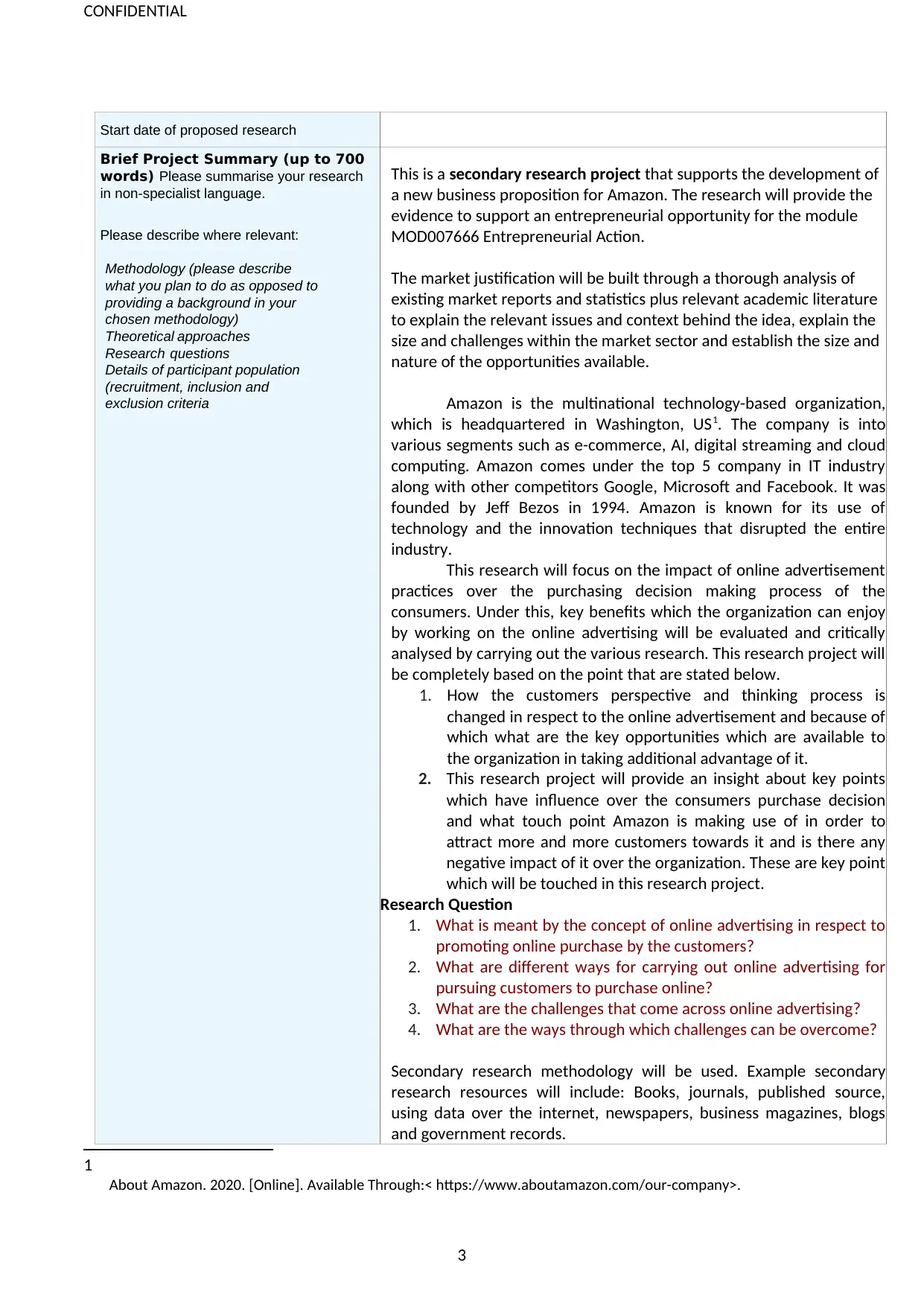
CONFIDENTIAL
Start date of proposed research
Brief Project Summary (up to 700
words) Please summarise your research
in non-specialist language.
Please describe where relevant:
Methodology (please describe
what you plan to do as opposed to
providing a background in your
chosen methodology)
Theoretical approaches
Research questions
Details of participant population
(recruitment, inclusion and
exclusion criteria
This is a secondary research project that supports the development of
a new business proposition for Amazon. The research will provide the
evidence to support an entrepreneurial opportunity for the module
MOD007666 Entrepreneurial Action.
The market justification will be built through a thorough analysis of
existing market reports and statistics plus relevant academic literature
to explain the relevant issues and context behind the idea, explain the
size and challenges within the market sector and establish the size and
nature of the opportunities available.
Amazon is the multinational technology-based organization,
which is headquartered in Washington, US1. The company is into
various segments such as e-commerce, AI, digital streaming and cloud
computing. Amazon comes under the top 5 company in IT industry
along with other competitors Google, Microsoft and Facebook. It was
founded by Jeff Bezos in 1994. Amazon is known for its use of
technology and the innovation techniques that disrupted the entire
industry.
This research will focus on the impact of online advertisement
practices over the purchasing decision making process of the
consumers. Under this, key benefits which the organization can enjoy
by working on the online advertising will be evaluated and critically
analysed by carrying out the various research. This research project will
be completely based on the point that are stated below.
1. How the customers perspective and thinking process is
changed in respect to the online advertisement and because of
which what are the key opportunities which are available to
the organization in taking additional advantage of it.
2. This research project will provide an insight about key points
which have influence over the consumers purchase decision
and what touch point Amazon is making use of in order to
attract more and more customers towards it and is there any
negative impact of it over the organization. These are key point
which will be touched in this research project.
Research Question
1. What is meant by the concept of online advertising in respect to
promoting online purchase by the customers?
2. What are different ways for carrying out online advertising for
pursuing customers to purchase online?
3. What are the challenges that come across online advertising?
4. What are the ways through which challenges can be overcome?
Secondary research methodology will be used. Example secondary
research resources will include: Books, journals, published source,
using data over the internet, newspapers, business magazines, blogs
and government records.
1
About Amazon. 2020. [Online]. Available Through:< https://www.aboutamazon.com/our-company>.
3
Start date of proposed research
Brief Project Summary (up to 700
words) Please summarise your research
in non-specialist language.
Please describe where relevant:
Methodology (please describe
what you plan to do as opposed to
providing a background in your
chosen methodology)
Theoretical approaches
Research questions
Details of participant population
(recruitment, inclusion and
exclusion criteria
This is a secondary research project that supports the development of
a new business proposition for Amazon. The research will provide the
evidence to support an entrepreneurial opportunity for the module
MOD007666 Entrepreneurial Action.
The market justification will be built through a thorough analysis of
existing market reports and statistics plus relevant academic literature
to explain the relevant issues and context behind the idea, explain the
size and challenges within the market sector and establish the size and
nature of the opportunities available.
Amazon is the multinational technology-based organization,
which is headquartered in Washington, US1. The company is into
various segments such as e-commerce, AI, digital streaming and cloud
computing. Amazon comes under the top 5 company in IT industry
along with other competitors Google, Microsoft and Facebook. It was
founded by Jeff Bezos in 1994. Amazon is known for its use of
technology and the innovation techniques that disrupted the entire
industry.
This research will focus on the impact of online advertisement
practices over the purchasing decision making process of the
consumers. Under this, key benefits which the organization can enjoy
by working on the online advertising will be evaluated and critically
analysed by carrying out the various research. This research project will
be completely based on the point that are stated below.
1. How the customers perspective and thinking process is
changed in respect to the online advertisement and because of
which what are the key opportunities which are available to
the organization in taking additional advantage of it.
2. This research project will provide an insight about key points
which have influence over the consumers purchase decision
and what touch point Amazon is making use of in order to
attract more and more customers towards it and is there any
negative impact of it over the organization. These are key point
which will be touched in this research project.
Research Question
1. What is meant by the concept of online advertising in respect to
promoting online purchase by the customers?
2. What are different ways for carrying out online advertising for
pursuing customers to purchase online?
3. What are the challenges that come across online advertising?
4. What are the ways through which challenges can be overcome?
Secondary research methodology will be used. Example secondary
research resources will include: Books, journals, published source,
using data over the internet, newspapers, business magazines, blogs
and government records.
1
About Amazon. 2020. [Online]. Available Through:< https://www.aboutamazon.com/our-company>.
3
⊘ This is a preview!⊘
Do you want full access?
Subscribe today to unlock all pages.

Trusted by 1+ million students worldwide
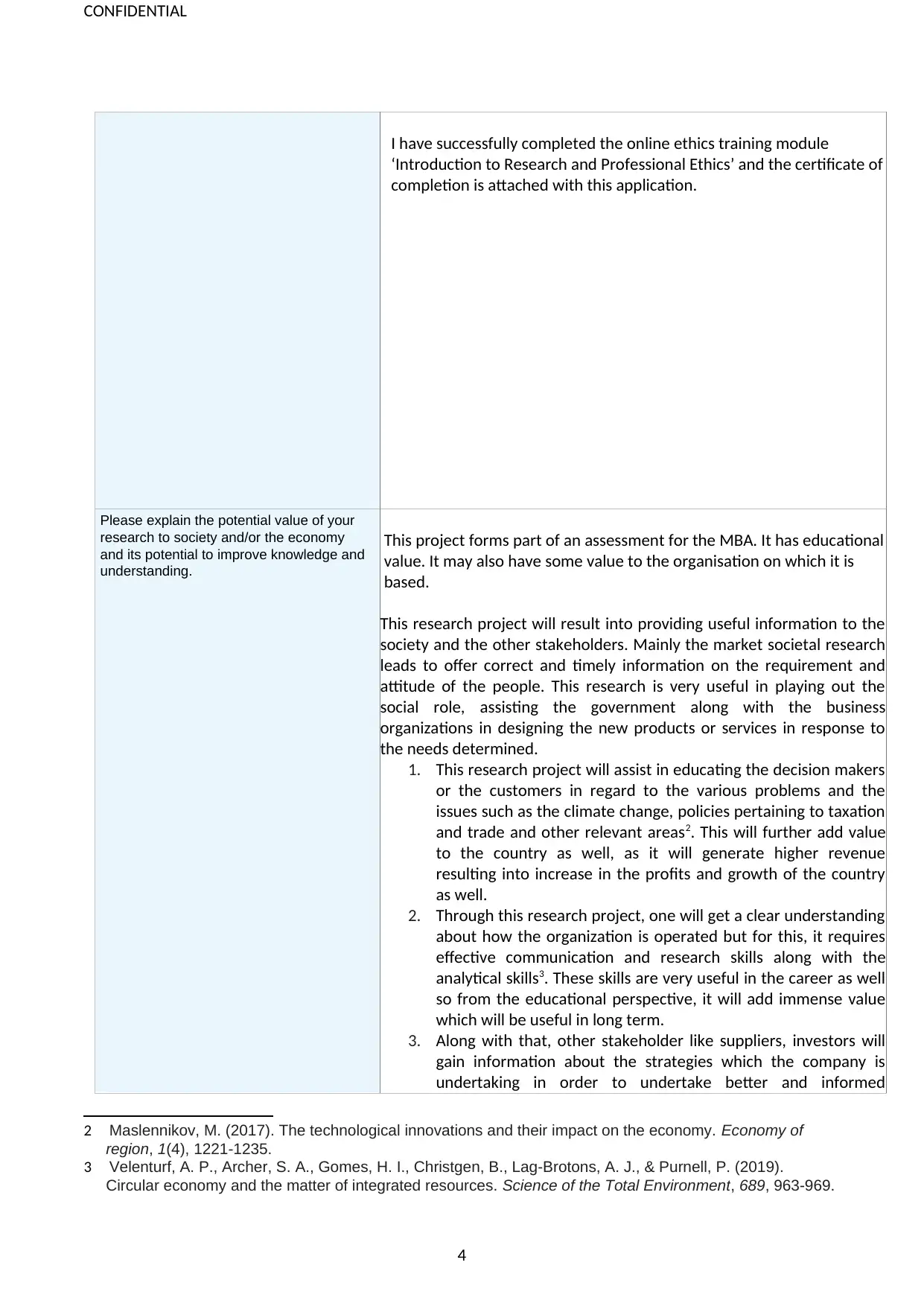
CONFIDENTIAL
I have successfully completed the online ethics training module
‘Introduction to Research and Professional Ethics’ and the certificate of
completion is attached with this application.
Please explain the potential value of your
research to society and/or the economy
and its potential to improve knowledge and
understanding.
This project forms part of an assessment for the MBA. It has educational
value. It may also have some value to the organisation on which it is
based.
This research project will result into providing useful information to the
society and the other stakeholders. Mainly the market societal research
leads to offer correct and timely information on the requirement and
attitude of the people. This research is very useful in playing out the
social role, assisting the government along with the business
organizations in designing the new products or services in response to
the needs determined.
1. This research project will assist in educating the decision makers
or the customers in regard to the various problems and the
issues such as the climate change, policies pertaining to taxation
and trade and other relevant areas2. This will further add value
to the country as well, as it will generate higher revenue
resulting into increase in the profits and growth of the country
as well.
2. Through this research project, one will get a clear understanding
about how the organization is operated but for this, it requires
effective communication and research skills along with the
analytical skills3. These skills are very useful in the career as well
so from the educational perspective, it will add immense value
which will be useful in long term.
3. Along with that, other stakeholder like suppliers, investors will
gain information about the strategies which the company is
undertaking in order to undertake better and informed
2 Maslennikov, M. (2017). The technological innovations and their impact on the economy. Economy of
region, 1(4), 1221-1235.
3 Velenturf, A. P., Archer, S. A., Gomes, H. I., Christgen, B., Lag-Brotons, A. J., & Purnell, P. (2019).
Circular economy and the matter of integrated resources. Science of the Total Environment, 689, 963-969.
4
I have successfully completed the online ethics training module
‘Introduction to Research and Professional Ethics’ and the certificate of
completion is attached with this application.
Please explain the potential value of your
research to society and/or the economy
and its potential to improve knowledge and
understanding.
This project forms part of an assessment for the MBA. It has educational
value. It may also have some value to the organisation on which it is
based.
This research project will result into providing useful information to the
society and the other stakeholders. Mainly the market societal research
leads to offer correct and timely information on the requirement and
attitude of the people. This research is very useful in playing out the
social role, assisting the government along with the business
organizations in designing the new products or services in response to
the needs determined.
1. This research project will assist in educating the decision makers
or the customers in regard to the various problems and the
issues such as the climate change, policies pertaining to taxation
and trade and other relevant areas2. This will further add value
to the country as well, as it will generate higher revenue
resulting into increase in the profits and growth of the country
as well.
2. Through this research project, one will get a clear understanding
about how the organization is operated but for this, it requires
effective communication and research skills along with the
analytical skills3. These skills are very useful in the career as well
so from the educational perspective, it will add immense value
which will be useful in long term.
3. Along with that, other stakeholder like suppliers, investors will
gain information about the strategies which the company is
undertaking in order to undertake better and informed
2 Maslennikov, M. (2017). The technological innovations and their impact on the economy. Economy of
region, 1(4), 1221-1235.
3 Velenturf, A. P., Archer, S. A., Gomes, H. I., Christgen, B., Lag-Brotons, A. J., & Purnell, P. (2019).
Circular economy and the matter of integrated resources. Science of the Total Environment, 689, 963-969.
4
Paraphrase This Document
Need a fresh take? Get an instant paraphrase of this document with our AI Paraphraser

CONFIDENTIAL
decisions. Thus, this research project has lot of potential which
can be used by the various types of users in gaining more
knowledge and undertake decision after taking consideration of
the same.
5
decisions. Thus, this research project has lot of potential which
can be used by the various types of users in gaining more
knowledge and undertake decision after taking consideration of
the same.
5
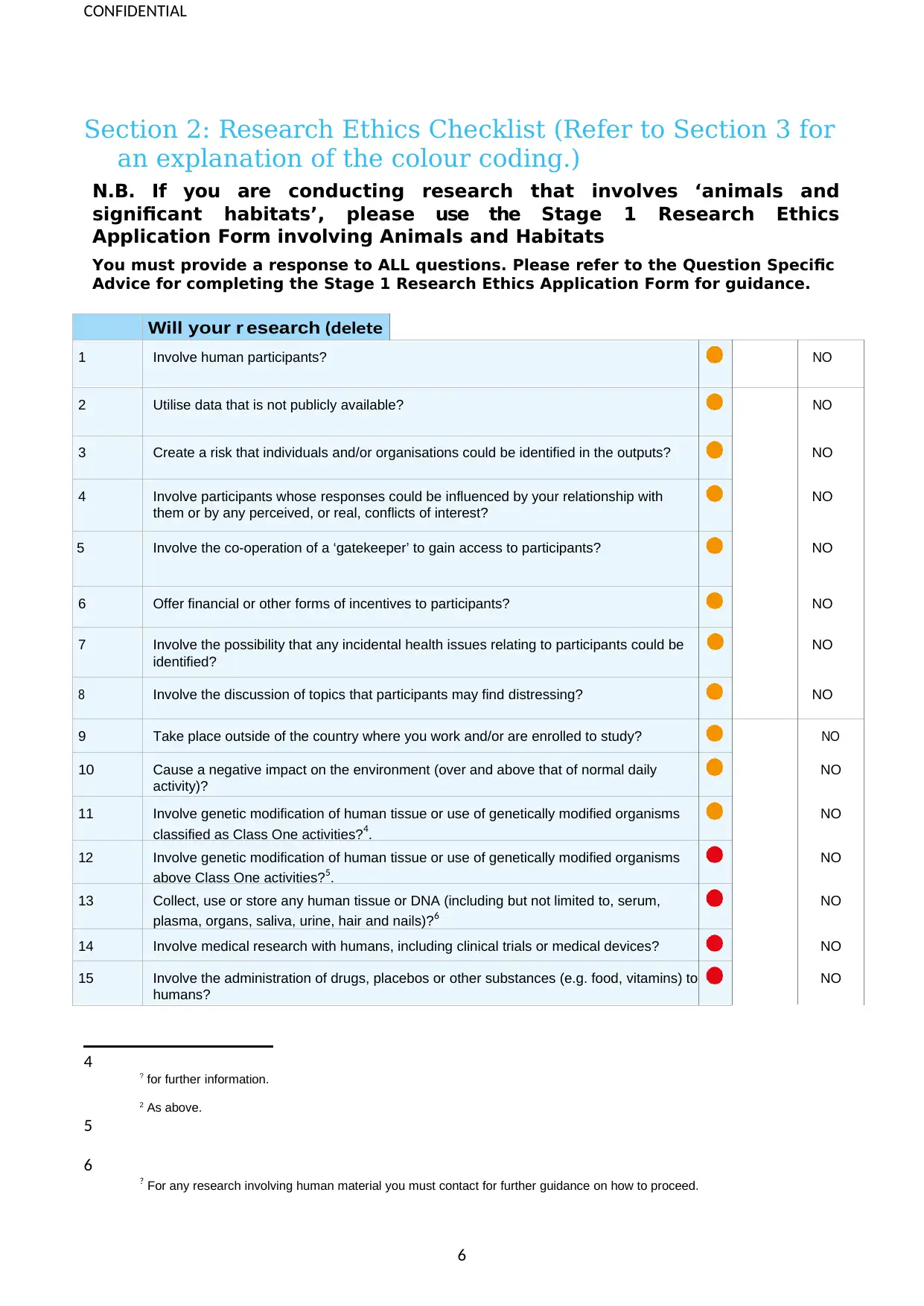
CONFIDENTIAL
Section 2: Research Ethics Checklist (Refer to Section 3 for
an explanation of the colour coding.)
N.B. If you are conducting research that involves ‘animals and
significant habitats’, please use the Stage 1 Research Ethics
Application Form involving Animals and Habitats
You must provide a response to ALL questions. Please refer to the Question Specific
Advice for completing the Stage 1 Research Ethics Application Form for guidance.
Will your r esearch (delete
as appropriate):1 Involve human participants? NO
2 Utilise data that is not publicly available? NO
3 Create a risk that individuals and/or organisations could be identified in the outputs? NO
4 Involve participants whose responses could be influenced by your relationship with
them or by any perceived, or real, conflicts of interest?
NO
5 Involve the co-operation of a ‘gatekeeper’ to gain access to participants? NO
6 Offer financial or other forms of incentives to participants? NO
7 Involve the possibility that any incidental health issues relating to participants could be
identified?
NO
8 Involve the discussion of topics that participants may find distressing? NO
9 Take place outside of the country where you work and/or are enrolled to study? NO
10 Cause a negative impact on the environment (over and above that of normal daily
activity)?
NO
11 Involve genetic modification of human tissue or use of genetically modified organisms
classified as Class One activities?4.
NO
12 Involve genetic modification of human tissue or use of genetically modified organisms
above Class One activities?5.
NO
13 Collect, use or store any human tissue or DNA (including but not limited to, serum,
plasma, organs, saliva, urine, hair and nails)?6
NO
14 Involve medical research with humans, including clinical trials or medical devices? NO
15 Involve the administration of drugs, placebos or other substances (e.g. food, vitamins) to
humans?
NO
4 ? for further information.
2 As above.
5
6 ? For any research involving human material you must contact for further guidance on how to proceed.
6
Section 2: Research Ethics Checklist (Refer to Section 3 for
an explanation of the colour coding.)
N.B. If you are conducting research that involves ‘animals and
significant habitats’, please use the Stage 1 Research Ethics
Application Form involving Animals and Habitats
You must provide a response to ALL questions. Please refer to the Question Specific
Advice for completing the Stage 1 Research Ethics Application Form for guidance.
Will your r esearch (delete
as appropriate):1 Involve human participants? NO
2 Utilise data that is not publicly available? NO
3 Create a risk that individuals and/or organisations could be identified in the outputs? NO
4 Involve participants whose responses could be influenced by your relationship with
them or by any perceived, or real, conflicts of interest?
NO
5 Involve the co-operation of a ‘gatekeeper’ to gain access to participants? NO
6 Offer financial or other forms of incentives to participants? NO
7 Involve the possibility that any incidental health issues relating to participants could be
identified?
NO
8 Involve the discussion of topics that participants may find distressing? NO
9 Take place outside of the country where you work and/or are enrolled to study? NO
10 Cause a negative impact on the environment (over and above that of normal daily
activity)?
NO
11 Involve genetic modification of human tissue or use of genetically modified organisms
classified as Class One activities?4.
NO
12 Involve genetic modification of human tissue or use of genetically modified organisms
above Class One activities?5.
NO
13 Collect, use or store any human tissue or DNA (including but not limited to, serum,
plasma, organs, saliva, urine, hair and nails)?6
NO
14 Involve medical research with humans, including clinical trials or medical devices? NO
15 Involve the administration of drugs, placebos or other substances (e.g. food, vitamins) to
humans?
NO
4 ? for further information.
2 As above.
5
6 ? For any research involving human material you must contact for further guidance on how to proceed.
6
⊘ This is a preview!⊘
Do you want full access?
Subscribe today to unlock all pages.

Trusted by 1+ million students worldwide
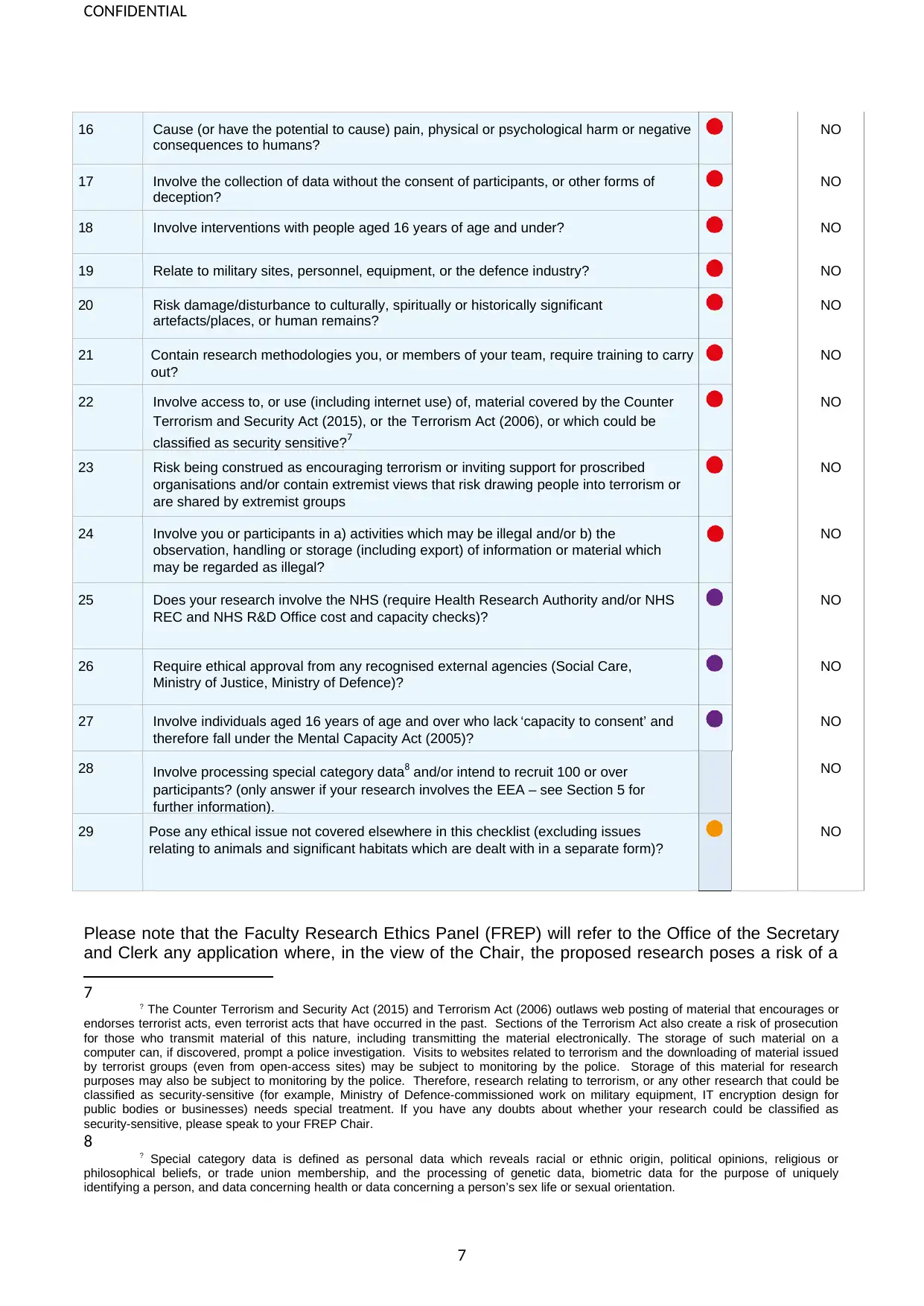
CONFIDENTIAL
16 Cause (or have the potential to cause) pain, physical or psychological harm or negative
consequences to humans?
NO
17 Involve the collection of data without the consent of participants, or other forms of
deception?
NO
18 Involve interventions with people aged 16 years of age and under? NO
19 Relate to military sites, personnel, equipment, or the defence industry? NO
20 Risk damage/disturbance to culturally, spiritually or historically significant
artefacts/places, or human remains?
NO
21 Contain research methodologies you, or members of your team, require training to carry
out?
NO
22 Involve access to, or use (including internet use) of, material covered by the Counter
Terrorism and Security Act (2015), or the Terrorism Act (2006), or which could be
classified as security sensitive?7
NO
23 Risk being construed as encouraging terrorism or inviting support for proscribed
organisations and/or contain extremist views that risk drawing people into terrorism or
are shared by extremist groups
NO
24 Involve you or participants in a) activities which may be illegal and/or b) the
observation, handling or storage (including export) of information or material which
may be regarded as illegal?
NO
25 Does your research involve the NHS (require Health Research Authority and/or NHS
REC and NHS R&D Office cost and capacity checks)?
NO
26 Require ethical approval from any recognised external agencies (Social Care,
Ministry of Justice, Ministry of Defence)?
NO
27 Involve individuals aged 16 years of age and over who lack ‘capacity to consent’ and
therefore fall under the Mental Capacity Act (2005)?
NO
28 Involve processing special category data8 and/or intend to recruit 100 or over
participants? (only answer if your research involves the EEA – see Section 5 for
further information).
NO
29 Pose any ethical issue not covered elsewhere in this checklist (excluding issues
relating to animals and significant habitats which are dealt with in a separate form)?
NO
Please note that the Faculty Research Ethics Panel (FREP) will refer to the Office of the Secretary
and Clerk any application where, in the view of the Chair, the proposed research poses a risk of a
7 ? The Counter Terrorism and Security Act (2015) and Terrorism Act (2006) outlaws web posting of material that encourages or
endorses terrorist acts, even terrorist acts that have occurred in the past. Sections of the Terrorism Act also create a risk of prosecution
for those who transmit material of this nature, including transmitting the material electronically. The storage of such material on a
computer can, if discovered, prompt a police investigation. Visits to websites related to terrorism and the downloading of material issued
by terrorist groups (even from open-access sites) may be subject to monitoring by the police. Storage of this material for research
purposes may also be subject to monitoring by the police. Therefore, research relating to terrorism, or any other research that could be
classified as security-sensitive (for example, Ministry of Defence-commissioned work on military equipment, IT encryption design for
public bodies or businesses) needs special treatment. If you have any doubts about whether your research could be classified as
security-sensitive, please speak to your FREP Chair.
8 ? Special category data is defined as personal data which reveals racial or ethnic origin, political opinions, religious or
philosophical beliefs, or trade union membership, and the processing of genetic data, biometric data for the purpose of uniquely
identifying a person, and data concerning health or data concerning a person’s sex life or sexual orientation.
7
16 Cause (or have the potential to cause) pain, physical or psychological harm or negative
consequences to humans?
NO
17 Involve the collection of data without the consent of participants, or other forms of
deception?
NO
18 Involve interventions with people aged 16 years of age and under? NO
19 Relate to military sites, personnel, equipment, or the defence industry? NO
20 Risk damage/disturbance to culturally, spiritually or historically significant
artefacts/places, or human remains?
NO
21 Contain research methodologies you, or members of your team, require training to carry
out?
NO
22 Involve access to, or use (including internet use) of, material covered by the Counter
Terrorism and Security Act (2015), or the Terrorism Act (2006), or which could be
classified as security sensitive?7
NO
23 Risk being construed as encouraging terrorism or inviting support for proscribed
organisations and/or contain extremist views that risk drawing people into terrorism or
are shared by extremist groups
NO
24 Involve you or participants in a) activities which may be illegal and/or b) the
observation, handling or storage (including export) of information or material which
may be regarded as illegal?
NO
25 Does your research involve the NHS (require Health Research Authority and/or NHS
REC and NHS R&D Office cost and capacity checks)?
NO
26 Require ethical approval from any recognised external agencies (Social Care,
Ministry of Justice, Ministry of Defence)?
NO
27 Involve individuals aged 16 years of age and over who lack ‘capacity to consent’ and
therefore fall under the Mental Capacity Act (2005)?
NO
28 Involve processing special category data8 and/or intend to recruit 100 or over
participants? (only answer if your research involves the EEA – see Section 5 for
further information).
NO
29 Pose any ethical issue not covered elsewhere in this checklist (excluding issues
relating to animals and significant habitats which are dealt with in a separate form)?
NO
Please note that the Faculty Research Ethics Panel (FREP) will refer to the Office of the Secretary
and Clerk any application where, in the view of the Chair, the proposed research poses a risk of a
7 ? The Counter Terrorism and Security Act (2015) and Terrorism Act (2006) outlaws web posting of material that encourages or
endorses terrorist acts, even terrorist acts that have occurred in the past. Sections of the Terrorism Act also create a risk of prosecution
for those who transmit material of this nature, including transmitting the material electronically. The storage of such material on a
computer can, if discovered, prompt a police investigation. Visits to websites related to terrorism and the downloading of material issued
by terrorist groups (even from open-access sites) may be subject to monitoring by the police. Storage of this material for research
purposes may also be subject to monitoring by the police. Therefore, research relating to terrorism, or any other research that could be
classified as security-sensitive (for example, Ministry of Defence-commissioned work on military equipment, IT encryption design for
public bodies or businesses) needs special treatment. If you have any doubts about whether your research could be classified as
security-sensitive, please speak to your FREP Chair.
8 ? Special category data is defined as personal data which reveals racial or ethnic origin, political opinions, religious or
philosophical beliefs, or trade union membership, and the processing of genetic data, biometric data for the purpose of uniquely
identifying a person, and data concerning health or data concerning a person’s sex life or sexual orientation.
7
Paraphrase This Document
Need a fresh take? Get an instant paraphrase of this document with our AI Paraphraser

CONFIDENTIAL
legal or security related nature to Anglia Ruskin University. The Chair will seek guidance from the
Secretary and Clerk before the FREP decides if the proposed research can be granted ethical
approval and/or the nature of any special arrangements which need to be put in place.
8
legal or security related nature to Anglia Ruskin University. The Chair will seek guidance from the
Secretary and Clerk before the FREP decides if the proposed research can be granted ethical
approval and/or the nature of any special arrangements which need to be put in place.
8
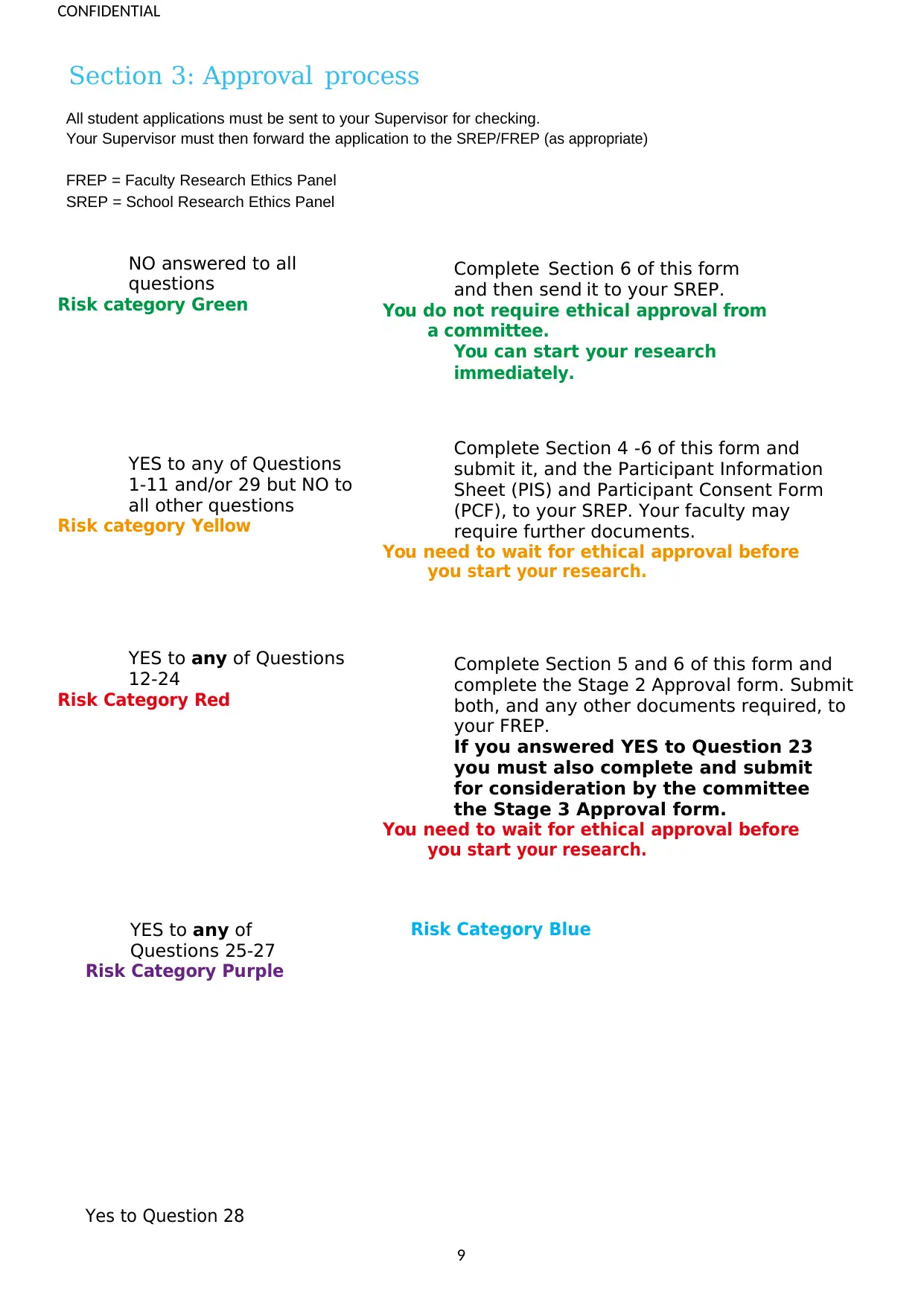
CONFIDENTIAL
Section 3: Approval process
All student applications must be sent to your Supervisor for checking.
Your Supervisor must then forward the application to the SREP/FREP (as appropriate)
FREP = Faculty Research Ethics Panel
SREP = School Research Ethics Panel
NO answered to all
questions
Risk category Green
Complete Section 6 of this form
and then send it to your SREP.
You do not require ethical approval from
a committee.
You can start your research
immediately.
YES to any of Questions
1-11 and/or 29 but NO to
all other questions
Risk category Yellow
Complete Section 4 -6 of this form and
submit it, and the Participant Information
Sheet (PIS) and Participant Consent Form
(PCF), to your SREP. Your faculty may
require further documents.
You need to wait for ethical approval before
you start your research.
YES to any of Questions
12-24
Risk Category Red
Complete Section 5 and 6 of this form and
complete the Stage 2 Approval form. Submit
both, and any other documents required, to
your FREP.
If you answered YES to Question 23
you must also complete and submit
for consideration by the committee
the Stage 3 Approval form.
You need to wait for ethical approval before
you start your research.
YES to any of
Questions 25-27
Risk Category Purple
Yes to Question 28
Risk Category Blue
9
Section 3: Approval process
All student applications must be sent to your Supervisor for checking.
Your Supervisor must then forward the application to the SREP/FREP (as appropriate)
FREP = Faculty Research Ethics Panel
SREP = School Research Ethics Panel
NO answered to all
questions
Risk category Green
Complete Section 6 of this form
and then send it to your SREP.
You do not require ethical approval from
a committee.
You can start your research
immediately.
YES to any of Questions
1-11 and/or 29 but NO to
all other questions
Risk category Yellow
Complete Section 4 -6 of this form and
submit it, and the Participant Information
Sheet (PIS) and Participant Consent Form
(PCF), to your SREP. Your faculty may
require further documents.
You need to wait for ethical approval before
you start your research.
YES to any of Questions
12-24
Risk Category Red
Complete Section 5 and 6 of this form and
complete the Stage 2 Approval form. Submit
both, and any other documents required, to
your FREP.
If you answered YES to Question 23
you must also complete and submit
for consideration by the committee
the Stage 3 Approval form.
You need to wait for ethical approval before
you start your research.
YES to any of
Questions 25-27
Risk Category Purple
Yes to Question 28
Risk Category Blue
9
⊘ This is a preview!⊘
Do you want full access?
Subscribe today to unlock all pages.

Trusted by 1+ million students worldwide
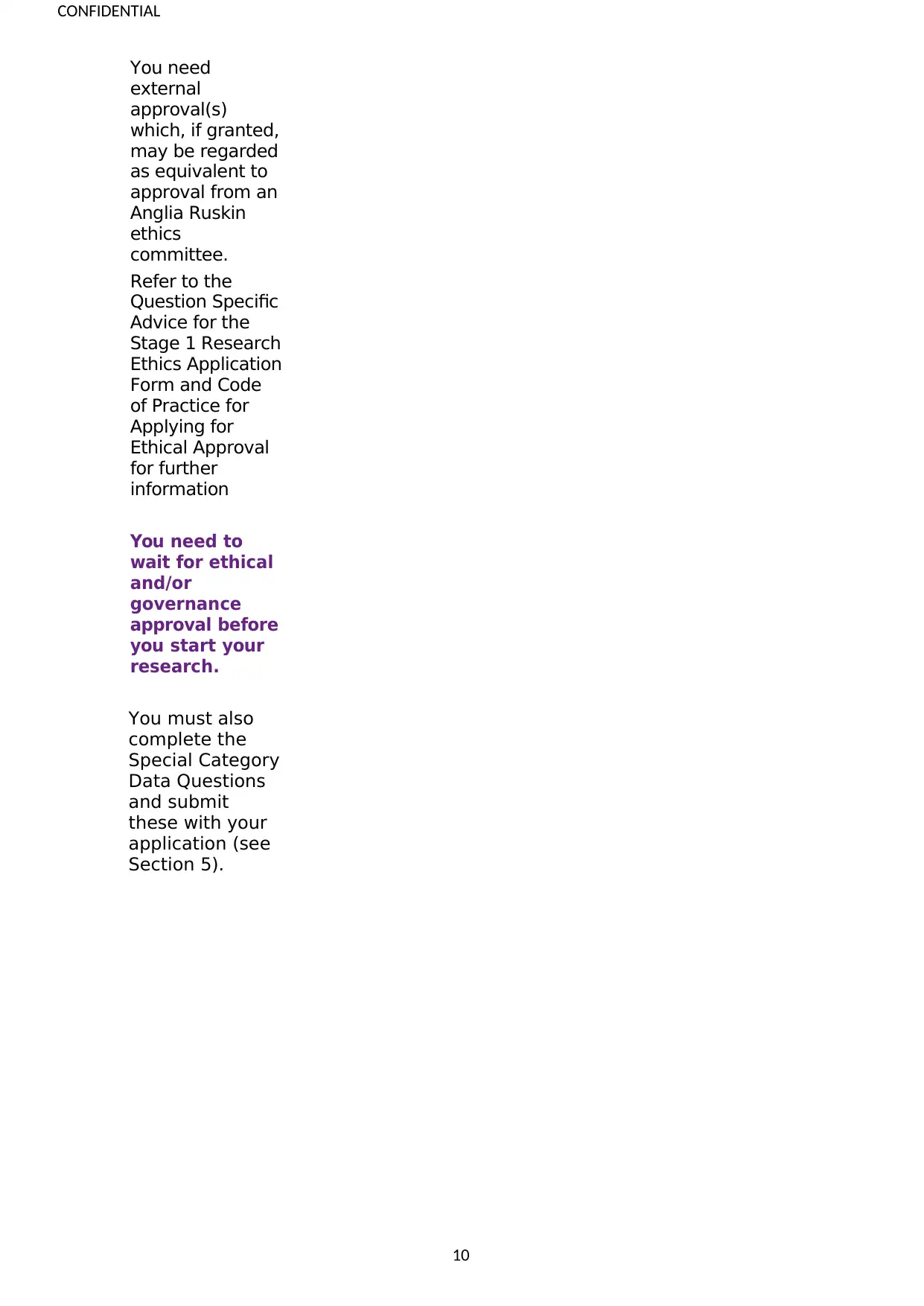
CONFIDENTIAL
You need
external
approval(s)
which, if granted,
may be regarded
as equivalent to
approval from an
Anglia Ruskin
ethics
committee.
Refer to the
Question Specific
Advice for the
Stage 1 Research
Ethics Application
Form and Code
of Practice for
Applying for
Ethical Approval
for further
information
You need to
wait for ethical
and/or
governance
approval before
you start your
research.
You must also
complete the
Special Category
Data Questions
and submit
these with your
application (see
Section 5).
10
You need
external
approval(s)
which, if granted,
may be regarded
as equivalent to
approval from an
Anglia Ruskin
ethics
committee.
Refer to the
Question Specific
Advice for the
Stage 1 Research
Ethics Application
Form and Code
of Practice for
Applying for
Ethical Approval
for further
information
You need to
wait for ethical
and/or
governance
approval before
you start your
research.
You must also
complete the
Special Category
Data Questions
and submit
these with your
application (see
Section 5).
10
Paraphrase This Document
Need a fresh take? Get an instant paraphrase of this document with our AI Paraphraser
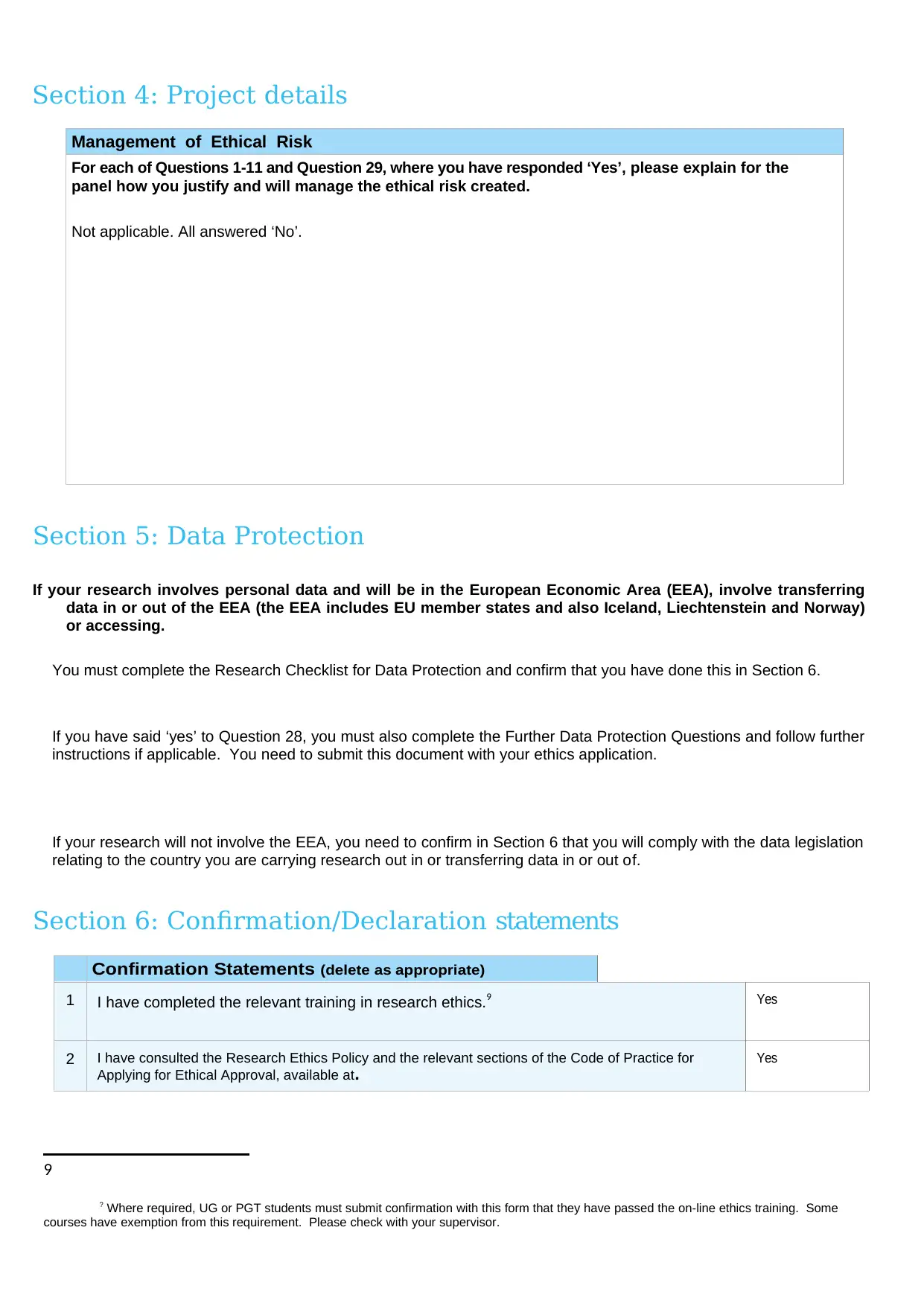
Section 4: Project details
Management of Ethical Risk
For each of Questions 1-11 and Question 29, where you have responded ‘Yes’, please explain for the
panel how you justify and will manage the ethical risk created.
Not applicable. All answered ‘No’.
Section 5: Data Protection
If your research involves personal data and will be in the European Economic Area (EEA), involve transferring
data in or out of the EEA (the EEA includes EU member states and also Iceland, Liechtenstein and Norway)
or accessing.
You must complete the Research Checklist for Data Protection and confirm that you have done this in Section 6.
If you have said ‘yes’ to Question 28, you must also complete the Further Data Protection Questions and follow further
instructions if applicable. You need to submit this document with your ethics application.
If your research will not involve the EEA, you need to confirm in Section 6 that you will comply with the data legislation
relating to the country you are carrying research out in or transferring data in or out of.
Section 6: Confirmation/Declaration statements
Confirmation Statements (delete as appropriate)
1 I have completed the relevant training in research ethics.9 Yes
2 I have consulted the Research Ethics Policy and the relevant sections of the Code of Practice for
Applying for Ethical Approval, available at.
Yes
9
? Where required, UG or PGT students must submit confirmation with this form that they have passed the on-line ethics training. Some
courses have exemption from this requirement. Please check with your supervisor.
Management of Ethical Risk
For each of Questions 1-11 and Question 29, where you have responded ‘Yes’, please explain for the
panel how you justify and will manage the ethical risk created.
Not applicable. All answered ‘No’.
Section 5: Data Protection
If your research involves personal data and will be in the European Economic Area (EEA), involve transferring
data in or out of the EEA (the EEA includes EU member states and also Iceland, Liechtenstein and Norway)
or accessing.
You must complete the Research Checklist for Data Protection and confirm that you have done this in Section 6.
If you have said ‘yes’ to Question 28, you must also complete the Further Data Protection Questions and follow further
instructions if applicable. You need to submit this document with your ethics application.
If your research will not involve the EEA, you need to confirm in Section 6 that you will comply with the data legislation
relating to the country you are carrying research out in or transferring data in or out of.
Section 6: Confirmation/Declaration statements
Confirmation Statements (delete as appropriate)
1 I have completed the relevant training in research ethics.9 Yes
2 I have consulted the Research Ethics Policy and the relevant sections of the Code of Practice for
Applying for Ethical Approval, available at.
Yes
9
? Where required, UG or PGT students must submit confirmation with this form that they have passed the on-line ethics training. Some
courses have exemption from this requirement. Please check with your supervisor.
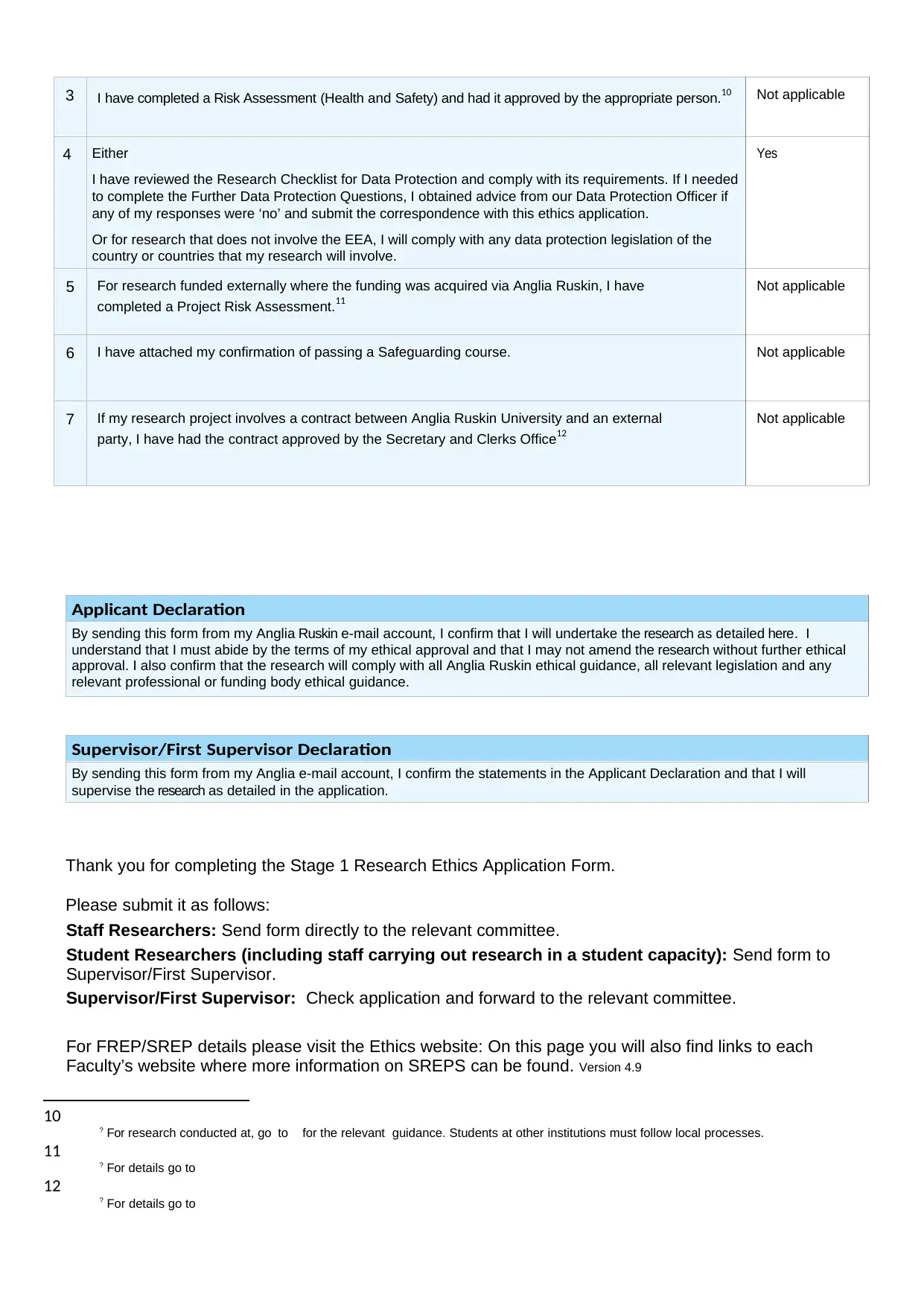
3 I have completed a Risk Assessment (Health and Safety) and had it approved by the appropriate person.10 Not applicable
4 Either
I have reviewed the Research Checklist for Data Protection and comply with its requirements. If I needed
to complete the Further Data Protection Questions, I obtained advice from our Data Protection Officer if
any of my responses were ‘no’ and submit the correspondence with this ethics application.
Or for research that does not involve the EEA, I will comply with any data protection legislation of the
country or countries that my research will involve.
Yes
5 For research funded externally where the funding was acquired via Anglia Ruskin, I have
completed a Project Risk Assessment.11
Not applicable
6 I have attached my confirmation of passing a Safeguarding course. Not applicable
7 If my research project involves a contract between Anglia Ruskin University and an external
party, I have had the contract approved by the Secretary and Clerks Office12
Not applicable
Applicant Declaration
By sending this form from my Anglia Ruskin e-mail account, I confirm that I will undertake the research as detailed here. I
understand that I must abide by the terms of my ethical approval and that I may not amend the research without further ethical
approval. I also confirm that the research will comply with all Anglia Ruskin ethical guidance, all relevant legislation and any
relevant professional or funding body ethical guidance.
Supervisor/First Supervisor Declaration
By sending this form from my Anglia e-mail account, I confirm the statements in the Applicant Declaration and that I will
supervise the research as detailed in the application.
Thank you for completing the Stage 1 Research Ethics Application Form.
Please submit it as follows:
Staff Researchers: Send form directly to the relevant committee.
Student Researchers (including staff carrying out research in a student capacity): Send form to
Supervisor/First Supervisor.
Supervisor/First Supervisor: Check application and forward to the relevant committee.
For FREP/SREP details please visit the Ethics website: On this page you will also find links to each
Faculty’s website where more information on SREPS can be found. Version 4.9
10 ? For research conducted at, go to for the relevant guidance. Students at other institutions must follow local processes.
11 ? For details go to
12 ? For details go to
4 Either
I have reviewed the Research Checklist for Data Protection and comply with its requirements. If I needed
to complete the Further Data Protection Questions, I obtained advice from our Data Protection Officer if
any of my responses were ‘no’ and submit the correspondence with this ethics application.
Or for research that does not involve the EEA, I will comply with any data protection legislation of the
country or countries that my research will involve.
Yes
5 For research funded externally where the funding was acquired via Anglia Ruskin, I have
completed a Project Risk Assessment.11
Not applicable
6 I have attached my confirmation of passing a Safeguarding course. Not applicable
7 If my research project involves a contract between Anglia Ruskin University and an external
party, I have had the contract approved by the Secretary and Clerks Office12
Not applicable
Applicant Declaration
By sending this form from my Anglia Ruskin e-mail account, I confirm that I will undertake the research as detailed here. I
understand that I must abide by the terms of my ethical approval and that I may not amend the research without further ethical
approval. I also confirm that the research will comply with all Anglia Ruskin ethical guidance, all relevant legislation and any
relevant professional or funding body ethical guidance.
Supervisor/First Supervisor Declaration
By sending this form from my Anglia e-mail account, I confirm the statements in the Applicant Declaration and that I will
supervise the research as detailed in the application.
Thank you for completing the Stage 1 Research Ethics Application Form.
Please submit it as follows:
Staff Researchers: Send form directly to the relevant committee.
Student Researchers (including staff carrying out research in a student capacity): Send form to
Supervisor/First Supervisor.
Supervisor/First Supervisor: Check application and forward to the relevant committee.
For FREP/SREP details please visit the Ethics website: On this page you will also find links to each
Faculty’s website where more information on SREPS can be found. Version 4.9
10 ? For research conducted at, go to for the relevant guidance. Students at other institutions must follow local processes.
11 ? For details go to
12 ? For details go to
⊘ This is a preview!⊘
Do you want full access?
Subscribe today to unlock all pages.

Trusted by 1+ million students worldwide
1 out of 13
Related Documents
Your All-in-One AI-Powered Toolkit for Academic Success.
+13062052269
info@desklib.com
Available 24*7 on WhatsApp / Email
![[object Object]](/_next/static/media/star-bottom.7253800d.svg)
Unlock your academic potential
Copyright © 2020–2026 A2Z Services. All Rights Reserved. Developed and managed by ZUCOL.





